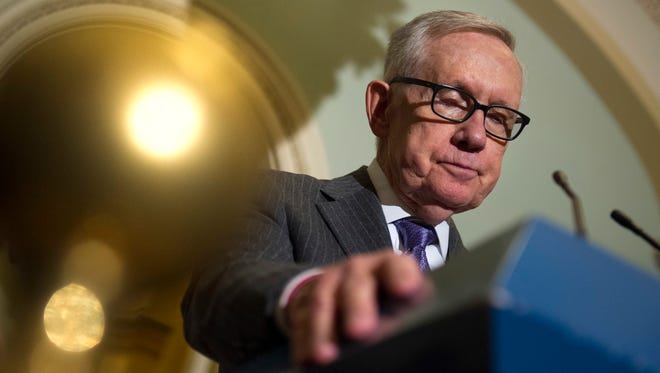Why Democrats made Harry Reid their leader: Ross K. Baker
He was no showman, but he offered political cover and the pastoral qualities of a village priest.

In the flood of tributes, retrospectives and commentaries on retiring Senate Democratic leader Harry Reid, strangely absent is any insight into why this astringent, soft-spoken Nevadan came to lead a diverse collection of ambitious, high-energy senators, most of whom would have shown better than Reid at political rallies or on Sunday talk shows. The reasons have much to do with the inner life of the United States Senate and little to do with the more visible world of cable news programs and online political banter.
Back in 2012, when I was a guest in Reid's office while on an academic sabbatical, I came across a recently published book by a political scientist that laid out what she said were the most desirable traits for a party leader in the Senate. High on the list was eloquence. I showed it to Reid and in characteristic taciturn style he quipped, "I'm not William Jennings Bryan."
That, of course, is an understatement. Standing behind the rope line with the journalists at the Tuesday afternoon "stakeout" that takes place after the parties have their caucus lunches, reporters assume tortured, contorted positions to get their microphones close enough to catch Reid's barely audible comments. When he's in good voice you need a mic of exquisite sensitivity; when he's suffering from a cold, forget it!
Obviously, it was not a commanding speaking style that earned him the loyalty of his fellow senators over the dozen years he held the reins of the party, following Tom Daschle's 2004 defeat. In that period, Reid never faced a serious challenge despite going in and out of the majority. So what magic elixir does this unprepossessing Westerner have that makes him so admired by senators, and not just Democrats?
Sessions pick is not the hill to die on: Ross K. Baker
The quality apparent to most outsiders is Reid's tactical skill and encyclopedic knowledge of the arcane rules and procedures of the Senate, which were honed as party whip under Daschle.
Unlike his predecessor, who found more interesting things to do than listen to colleagues droning on in an empty chamber, Reid haunted the floor. This is no minor talent when you need to know the rules to outsmart opponents who mean to do you political harm. He learned how to protect Democrats from mischievous amendments laid as traps by the Republicans. He was able to endow his caucus members with the most precious gift a politician can receive: political cover.
But it was more than using procedural sleight of hand to shield vulnerable colleagues. Reid was more than willing to take the blame for others at times of fault-finding. He was also a great listener. He had the pastoral qualities of a village priest and was able to dispense tactical advice by tipping off senators to upcoming problems and find ways to protect them. While helpful and supportive, he was no pushover. I remember his telling the staff that he hated to say "no" to people. He might have hated it, but he didn't shy away from it.
Reid used the telephone the way Reggie Jackson used the baseball bat; it was his tool of choice. Conversations were typically brief, even with President Obama; he didn't want to waste his time with idle chatter. It was in these conversations with other senators that his transactional talent came to the fore. Reid would push for agreement and proclaim it even when the person on the other end was still making up his mind.
Trump's GOP must not stand: Christian Schneider
POLICING THE USA: A look at race, justice, media
Hard-edged partisan that he was, Reid's regard for colleagues was remarkably ecumenical. He was a shrewd judge of a colleague's political skills, which led him to admire Republicans such as Alabama's Richard Shelby and Kentucky's Rand Paul. Reid admired them as political craftsmen. I recall sitting on the Senate subway next to Oklahoma Republican Tom Coburn, who took me for a tourist and asked me what I was doing in Washington. I replied that I was a guest in Reid's office. "You're going to learn a lot from Harry." He replied. It was one great tactician admiring another one.
Reid won his Senate seat in 1986 with the slogan "Independent Like Nevada" and ultimately presided over a 21st century Democratic Party that emphasized race, ethnicity and social issues. Never an ideologue, he adapted gracefully to the changes. But I believe he felt a little ill at ease with some of them.
Above all, Reid knew how to win elections, and his crowning achievement was transforming Nevada into a reliably blue state. That may also turn out to be his most enduring achievement.
Ross K. Baker is a distinguished professor of political science at Rutgers University and a member of USA TODAY's Board of Contributors.
You can read diverse opinions from our Board of Contributors and other writers on the Opinion front page, on Twitter @USATOpinion and in our daily Opinion newsletter. To submit a letter, comment or column, check our submission guidelines.